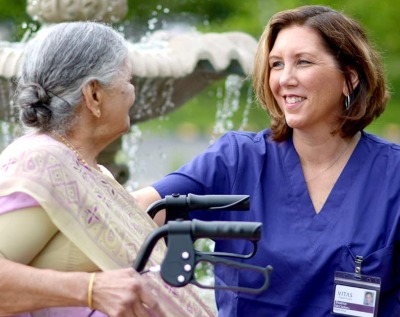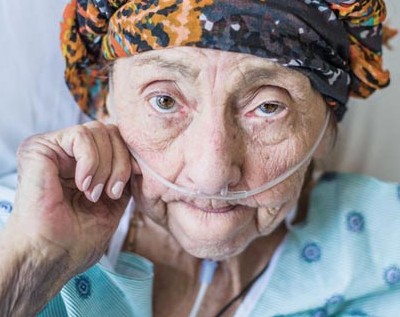A Compassionate Approach to Holiday Grief
By Jessica McClure, LCSW, VITAS Healthcare
The holiday season is often associated with joy, family, and togetherness. However, it can become a time of heightened grief for those who have experienced loss or those who are caring for a loved one near the end of life.
Memories of past celebrations become a source of heartache, and the prospect of a future without their loved one can be overwhelming. Grieving individuals may also feel pressured to conceal their pain to avoid affecting the celebrations of others.
Healthcare professionals are well-positioned to play an impactful role in supporting grieving patients and their family caregivers through the holiday season. By recognizing the signs and risks of intense grief, validating the patient’s or caregiver’s emotions, and connecting the patient with clinical resources, clinicians can guide their patients and their loved ones toward a healthy mourning process.
Types of Grief
Grief takes various forms in patients with advanced illness, including disenfranchised grief, anticipatory grief, delayed grief, complicated grief, cumulative grief, and secondary losses. All of these can occur and overlap during the holiday season.
- Disenfranchised grief describes grief that is not socially acknowledged or accepted. A person experiencing disenfranchised grief during the holidays may feel intense pressure to appear cheerful so they don’t disrupt a celebratory atmosphere.
- Anticipatory grief, which is especially relevant to hospice care, involves mourning before a loved one's passing. A person experiencing anticipatory grief imagines their life—including milestones, holidays, and traditions—without their loved one, and they grieve for their lost future together.
- Delayed grief is grief experienced a significant amount of time after a loss. A person who appeared to process their initial loss quickly may find their pain resurfaces months or years after it occurred. Delayed grief is sometimes triggered by events in the mourner’s life, but it can also occur without a clear inciting event.
- Complicated grief does not lessen in intensity over time, as many mourners expect their grief to do. Like disenfranchised grief, it can foster intense guilt in mourners who feel they should already have processed their loss and moved on.
- Cumulative grief is a build-up of grief from multiple losses.
- Secondary losses are the abstract losses that accompany a loved one’s death. For example, losing a spouse may lead to the secondary loss of financial or emotional stability.
Supporting Grieving Patients
Healthcare professionals play a pivotal role in supporting grieving patients with steps such as validating the need to grieve, being mindful of physical health risks associated with intense grief, and connecting individuals with specialized resources.
When caring for a person in the process of mourning, clinicians should prioritize:
- Encouraging a healthy grieving process.
- Authoritative, knowledgeable caregivers can help patients overcome grief-related feelings of shame and isolation by validating their need to grieve, reminding them that everyone’s grief timeline is different, and providing a nonjudgmental space for the patient to express their emotions. By normalizing the expression of grief, clinicians create an environment where patients and their families are comfortable verbalizing feelings and processing thoughts.
- Addressing physical health risks.
- Grief may give rise to physical health challenges, necessitating a considerate and all-encompassing strategy from healthcare professionals. Clinicians should monitor their patients for significant changes in weight, unusual sleep patterns, and indications of maladaptive coping mechanisms such as excessive drinking. In evaluating individuals whose physical well-being has declined due to grief, clinicians may utilize a blend of medical assessments and open, empathic discussions.
- Collaboratively, clinicians and patients can create treatment plans that incorporate adjustments in diet, practices to enhance sleep quality, and develop safeguards to curb maladaptive behaviors. By concentrating on the physical welfare of those in grief, clinicians actively contribute to a comprehensive approach that recognizes the interrelation between mental and physical health throughout the grieving process.
- Connecting the patient with specialized long-term support.
- Individual therapy provides a private environment for patients to discuss and process the complex feelings that arise from grief. If a patient appears to be experiencing prolonged or especially severe mental health challenges in response to a loss, consider referring them to a licensed clinical therapist.
- Support groups, whether in-person or virtual, foster the creation of communities where shared experiences lead to understanding.
- National organizations and online platforms ensure that individuals do not face their journey alone. Social media contains many spaces, including dedicated Facebook bereavement pages, that allow patients to find solace, share their narratives, and access valuable resources.
The VITAS Approach to Grief
VITAS incorporates all of the above principles into its support services, emphasizing the importance of validating the grieving process. Increased visits to homes and facilities ensure that individuals receive the necessary support when a loved one has died or is near the end of life. VITAS also offers a national virtual bereavement event as a platform for participants to come together, hear uplifting messages from bereavement specialists, and share memories of their loved ones.
Local initiatives such as candle-lighting ceremonies provide in-person support to the bereaved community.
Some other ways VITAS provides support to grieving families include:
- Condolence and check-in calls:
- Families of deceased patients receive personalized condolence and check-in calls, providing ongoing support and a compassionate touch throughout the year following the death.
- Bereavement mailings:
- VITAS extends its support through bereavement mailings, offering additional resources, information, and comforting messages to families coping with loss.
- Inclusive support for all involved, including healthcare workers:
- Acknowledging that grief extends beyond families to include VITAS staff members and facility staff where the patient resided, VITAS ensures a comprehensive approach.
- Bereavement events:
- VITAS organizes bereavement events to bring individuals together, providing opportunities for shared experiences, uplifting messages from specialists, and a platform to honor loved ones.
- Individual and group supportive counseling:
- Families and individuals receive personalized support through both individual and group counseling sessions, allowing for tailored assistance based on unique needs and preferences.
- Facilitation of support group connections:
- VITAS aims to help bereaved individuals build their support systems by facilitating connections with specialized resources, with a particular focus on support groups.
- National virtual support groups:
- Family members or caregivers of VITAS patients can join national virtual support groups, offering a platform for shared experiences and a sense of community, irrespective of geographical locations.
- Facebook bereavement page:
- VITAS maintains a dedicated Facebook bereavement page overseen by bereavement managers, providing a safe virtual space. Here, individuals can share experiences, connect with others, and access valuable resources.
VITAS is dedicated to meeting individuals where they are in their grief journey and building a robust support system. As a healthcare professional, referring your patient to VITAS ensures they receive personalized and empathetic bereavement care during the holiday season and beyond.

Check Hospice Guidelines
Get diagnosis-specific guidelines in our hospice eligibility reference guide.
Hospice Guidelines by Diagnosis Refer Your Patient
